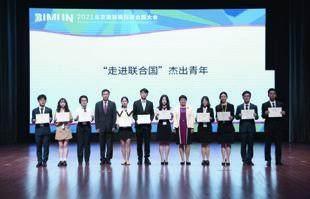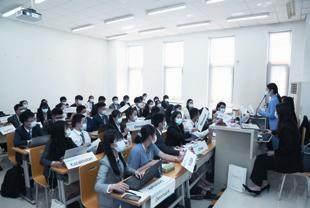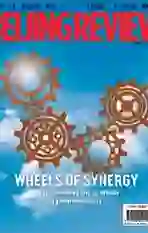Getting Started On Campus
2021-06-30BySunXuan
By Sun Xuan


‘I started participating in the Model United Nations (MUN) activities when I was in middle school. In high school, I competed in the Beijing MUN, the premier national MUN gathering in China organized by China Foreign Affairs University (CFAU). That sowed the seed of my dream to study at the university and take part in the organization of this event,” Lu Zhiyuan told Beijing Review. Today, he is a senior student at his dream college and serves as president of the CFAU Model United Nations Association. In doing so, he has realized that teenage dream.
MUN simulations are popular exercises for those interested in learning more about how the UN operates. Hundreds of thousands of students worldwide take part every year at all educational levels—from primary school to university. Many of todays leaders in law, government, business and the arts—including at the UN itself—participated in MUN conferences as students, the UN website reads. The program was first introduced into China by the CFAU, known as the cradle of Chinas diplomats, in 1995. The association, in turn, was founded in 2001 and has organized 13 editions of MUN activities to date.
In 2017, the Beijing MUN was renamed the Beijing International Model United Nations (BIMUN). Meanwhile, it adopted the Beijing Rules of Procedure. This move marked a new stage of development for the BIMUN and indicated the greater mission and responsibility it shoulders.
Cui Qiming, Secretary of the CFAU Committee of the Communist Party of China and former Chinese Ambassador to Belarus, said in over two decades, MUN activities have helped the participants cultivate a greater awareness of global citizenship, expand their vision and enhance their abilities in dealing with so- phisticated issues.
Many of the participating students joined diplomatic services after college graduation and are working hard to make Chinas voice heard in the international arena.
A platform
This years BIMUN conference took place from May 20 to 23. About 650 students from more than 160 high schools and universities were divided into 10 groups. They discussed topics such as the Korean Peninsula peace process, global population aging, post-COVID-19 tourism revival and the role of women in peacekeeping operations.
Designated to represent different countries, regions or organizations, the participants need to understand the issues at their core, maintain their own position firmly during the debates while avoiding failing to reach a draft resolution because of occurring differences. Nicolas Chapuis, Ambassador of the EU to China, told Beijing Review that it is an opportunity for young people to understand the reality of diplomatic exchanges and put what they have learned into practice.
